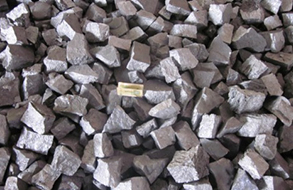Chinese ferrosilicon market still not to be optimistic in H2 2019
----Interview with Liu Liming
General Manager
Ningxia Hao Ruisen Industrial Co., Ltd.
- Ningxia Hao Ruisen Industrial Co., Ltd. is mainly engaged in the trading of ferrosilicon and other ferroalloys used in steel mills. Mr. Liu Liming used to work as the director of sales department of Ningxia Tianjing Metallurgy Co., Ltd. for 18 years. He is doing research for the ferrosilicon spot and commodity market for many years.
- Asian Metal: Thank you for accepting Asian Metal's exclusive interview, please introduce your business briefly.
- Mr. Liu: Hao Ruisen Industrial Co., Ltd. was established two years ago, and we mainly involve in ferrosilicon, silicon carbide, semi coke, and other ferroalloys and refractory.
- Asian Metal: What's your monthly trading volume of ferrosilicon?
- Mr. Liu: It's about 4,000tpm, including ferrosilicon of 20%max and high-purity ferrosilicon, of which domestic market accounts for 80%, and export market takes up 20%. We have around six regular clients from Chinese steel mills and foundries.
- Asian Metal: As your company is located in Ningxia, how do you evaluate the inventory in Ningxia area in late June?
- Mr. Liu: The inventory of larger-sized factories is heavy with high prices, while, the inventory of smaller-sized plants is slight with lower prices. The larger sized factories would put their high inventory into commodity market as a hedge against price decreases. However, smaller-sized plants are not capable to leverage commodity market as a hedge tool because they don't have many stocks. The price from larger-sized factories is higher than the market price.
- Asian Metal: You mentioned the inventory is large, and could you talk about it more specifically?
- Mr. Liu: I evaluated the inventory is still at a high level based on producers' quotations and the market transaction situation. If the plant does not have inventory, it is delivered to warehouse, and the goods weren't consumed by end users. We calculated that there was about 200,000t of inventory in total in warehouse and plants in late June, which was 100,000t less than that at the beginning of this year, so the price of ferrosilicon stopped falling.
- Asian Metal: As prices of ferrosilicon fluctuated up and down, do you keep regular stocks?
- Mr. Liu: There is no need to keep massof stocks, but we do have some back-up stocks to meet domestic and foreign customers ' needs. Under the gloomy global business circumstances and the unsteady Chinese economic environment, we mainly do back-to-back trading. We prefer to sell stocks in commodity market at first to hedge the price decrease, and buy ferrosilicon back from commodity market to minimum our purchase cost. It's harder and harder to get profits in export market, and the profit rate in 2019 touched the lowest point in recent years.
- Asian Metal: How do you evaluate the overall trend of ferrosilicon prices in Q3? Will producers suspend production one after another?
- Mr. Liu: I believe the price in ferrosilicon commodity market in July would show downward trend, which will accelerate the decline of spot prices. The production cost of ferrosilicon would probably edge down as electricity cost in Qinghai area has been confirmed to go down in the rainy season. The electricity wheeling cost in Ningxia area would possibly be cut in Q4.
- Additionally, many ferrosilicon producers in Ningxia successively carried out facility-rotational-overhaul and replacements of automatic feeding system in Q2 and at latest in Q3. Some new furnaces in Fugu, Shaanxi area would come on stream in late Q3. Consequently, ferrosilicon production capacity would be released then.
- At present, the net production cost of ferrosilicon 72%min in Ningxia for small and medium-sized plants is about RMB5,400/t (USD784/t), and the cost of that in Qinghai is even lower. Some costs as depreciation and financial expenses are not counted. With many furnaces having been running for many years, some plants can even ignore the depreciation as it basically was accounted for many years ago. Moreover, stopping and resuming furnace is a big loss for ferrosilicon plants, so they would not stop the furnace.
- Asian Metal: How do you describe the current Chinese ferrosilicon export market?
- Mr. Liu: There are some unconventional export operations in Chinese ferrosilicon export market, but we cannot compete with them. We mainly do low aluminum ferrosilicon trading as the profit is slightly better than ferrosilicon with aluminum 2.0%max, and the demand is small but stable. Exports of Chinese ferrosilicon to the United States reduced by 10,000t compared with last year, and we can barely export to Europe due to the anti-dumping duties. In addition, Indonesia's Qing Shan Steel decreased their imports from 10,000tpm to 3,000tpm from China after they built its own ferrosilicon plant. Overall, Chinese ferrosilicon export market would witness stability with a slight-decline tendency.


